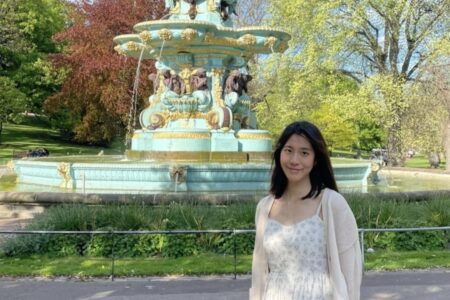
Ever wonder who makes sure there are still fish in the sea — or in your favourite sushi roll?
That’s the job of fisheries scientists. And no, it’s not just about fish tanks and lab coats (though those show up too). Fisheries science is where biology, ecology, technology, and a bit of detective work all come together.
It’s about understanding how fish, people, and the environment all interact — a balancing act to keep ecosystems healthy, communities thriving, and yes, your future seafood dinners possible.
Meet Mary Opeyemi Adebote, one of the many passionate professionals diving deep (literally and figuratively) into this world.
Her research spotlighting an often-overlooked, but no less important part of the fishing world.

Adebote’s current research for her PhD in Fishing and Fisheries Sciences and Management focuses on the drivers of compliance within recreational fisheries for summer flounder. Source: Mary Opeyemi Adebote
PhD in Fisheries Science: The importance of understanding recreational fishing
There’s something magical about fishing. The quiet calm of a lake. The soothing rhythm of casting a line. That thrill when the rod suddenly jerks. It’s peaceful… until it’s not.
For many, recreational fishing is a great way to relax. But beneath that calm surface, there’s a growing ripple of concern.
That’s where Adebote’s PhD research comes in.
“Over time, I’ve noticed that management of fisheries is being overlooked in the decision-making process as most of the attention is often focused on commercial fishers as they’re the ones who bring in millions to the industry,” she shares.
“But there’s more to recreational fisheries, so I’m trying to bridge the gap and understand them — seeing how much they catch and how their catches are impacting the fish population.”
Think about it: while some recreational fisheries require catch-and-release practices, not all fish survive after being released. Multiply that by the thousands of people fishing every weekend, and suddenly, even a “harmless hobby” can have real environmental consequences.
“There are hundreds of thousands of people who engage in recreational fishing,” Adebote points out. “So just imagine the number of fish that don’t survive.”
Her research aims to fill the data gaps, ensuring that this beloved pastime stays sustainable for generations to come.
She’s also tracking the journey of a particular fish species — the summer flounder — whose natural migration patterns are being thrown off course by climate change.
“Because of rising ocean temperatures, the summer flounder, which usually lives in southern waters, is now moving north,” she explains.
These shifts affect local communities that depend on predictable fish populations for income, food, and tradition.
“If fish disappear from an area, people lose their jobs,” says Adebote. “Understanding how and why this is happening can help these communities adapt and survive.”
So yes — her work is about fish, but it’s also about people.

Beyond academia, Adebote is passionate about leadership and community development. SH has volunteered with organisations such as One Million Leaders Africa, Young African Leaders Initiative, Young African Women Congress, and more. Source: Mary Opeyemi Adebote
Fish wasn’t her first love, but it’s her greatest one now
Adebote didn’t always dream of becoming a fisheries scientist. Like many kids, she once had more “classic” ambitions.
“I used to say I wanted to be a lawyer,” she laughs. “It’s the most renowned profession, right? But when it came time to apply, I decided to take a chance on a different path.”
That chance was to study fisheries science.
Adebote pursued a Bachelor’s in Aquaculture and Fisheries Management at the Federal University of Agriculture, Abeokuta, Nigeria.

After completing her PhD, Adebote is driven to continue research in addressing critical environmental challenges in fisheries while applying her expertise to broader environmental issues. Source: Mary Opeyemi Adebote
Her hard work earned her the prestigious World Bank Scholarship, which took her to the University of Cape Coast in Ghana, where she completed her MPhil in Fisheries Science with distinction.
During that time, she joined professional bodies such as the British Ecological Society and the Fisheries Society of Nigeria.
Today, Adebote is pursuing her PhD in Fishing and Fisheries Sciences and Management at Virginia Tech, where she’s also a recipient of the Diversity Fellowship from the Global Change Centre.
Mary Opeyemi Adebote didn’t set out to fall in love with fish — but now she’s leading research that could change the way we understand and manage our relationship with the water and all life in it.
And the next time someone tells you that fishing is just a relaxing hobby, you’ll know there’s a whole lot more going on beneath the surface thanks to her.










